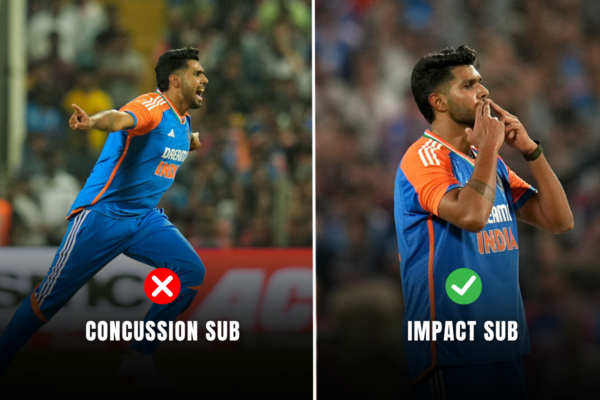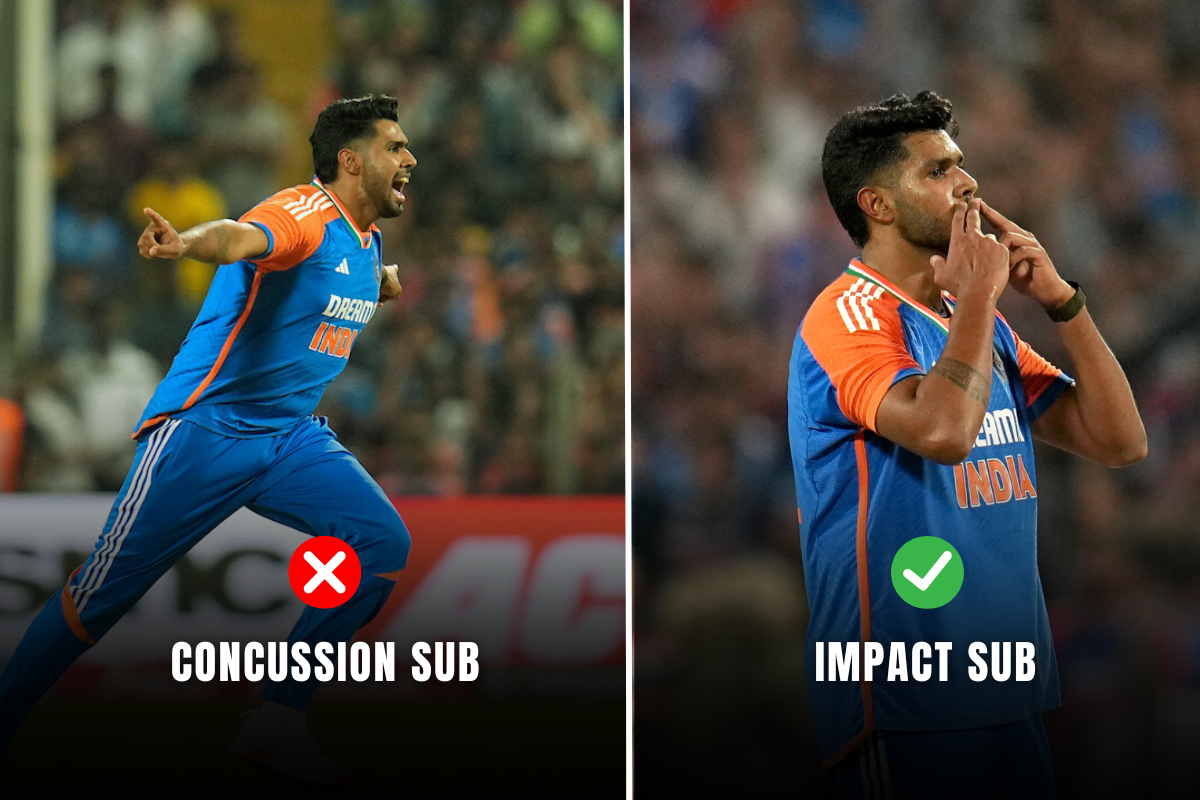

The concussion sub used by India in the fourth T20I against England (replacing Shivam Dube with Harshit Rana) is sparking a lot of controversy after the KKR fast bowler took a three-wicket haul on what was his maiden T20I appearance to swing the game.
Dube, who hit a fine fifty, had been hit on the helmet by Jamie Overton off the second last ball of the India innings. He received a quick check-up from the Indian team physio on the ground and went on to face the final delivery, helping India reach 181/9.
But later on, during England’s run chase, Dube, who had not come onto the field at all, was replaced by Harshit Rana, a decision confirmed at the end of the 10th over. A bowling all-rounder replacing a batting all-rounder right when the team was bowling sounded too convenient and unfair. Jos Buttler immediately made his displeasure known, but Rana was allowed in, going on to make a significant impact in the match with his three wickets.
“It is not a like-for-like replacement. We don’t agree with that,” Buttler said in the post-match press conference.
“Either Shivam Dube has put on about 25mph with the ball or Harshit has really improved his batting. It’s part of the game and we really should have gone on to win the match, but we disagree with the decision.” – Jos Buttler.
“There was no consultation [with us]. That’s something I was thinking as I came out to bat – who is Harshit on for? They said he is a concussion replacement, which I obviously disagreed with. It is not a like-for-like replacement. They said that the match referee had made the decision. We had no say in it or any part of it. But we’ll ask Javagal Srinath some questions just to get some clarity around it.
“Like I said, it was not the whole reason why we did not win the match. We had our chances to win the game which we could have still taken. But I’d like to have a bit more clarity on that.”
Former England cricketers, including Kevin Pietersen and Michael Vaughan, also chimed in with their displeasure.
“If you ask anybody in the world whether Harshit Rana is a like-for-like replacement, I’m not sure anyone would say that they are,” Pietersen said while on commentary.
“He gets an extra bit of pace. He is a tall, bustling fast bowler. I can tell you something now, that England dressing room will not be happy. Jos Buttler wasn’t happy when he got out because of the substitution. It’s not like for like.”
“So he (Srinath) has decided that Shivam Dube is going to bowl four overs in the second innings? I can guarantee you if Shivam Dube had have bowled four overs, England would’ve chased that target down,” Michael Vaughan added on Cricbuzz.
While the English clamour over the decision, the law by itself does not explicitly state that such a concussion sub is not allowed, but there is clarity on how it should be interpreted.
At first glance, Srinath’s decision was entirely by the law. Clause 1.2.7.4 of the ICC’s T20I Playing Conditions clearly states that “in assessing whether the nominated Concussion Replacement should be considered a like-for-like player, the ICC Match Referee should consider the likely role the concussed player would have played during the remainder of the match, and the normal role that would be performed by the nominated Concussion Replacement.”
Since it was the second innings and India were bowling, the rough interpretation of the law would mean India can replace Dube with anyone who would play his role in that half of the innings—basically, bowling and fielding. And that is all Rana did. At the time the law was introduced, former ICC CEO Geoff Allardice had explained that “every circumstance is going to be different depending on when the player is requested to be replaced”. The “likely role” Dube would’ve played is where the law gets tricky, given how infrequent a bowler Dube is.
Also Read:
But the law does account for avoiding unfair advantages to teams. Clause 1.2.7.3 states that “The ICC Match Referee should ordinarily approve a Concussion Replacement Request if the replacement is a like-for-like player whose inclusion will not excessively advantage his/her team for the remainder of the match.”
Clause 1.2.7.5 further clarifies this: “If the ICC Match Referee believes that the inclusion of the nominated Concussion Replacement, when performing their normal role, would excessively advantage their team, the ICC Match Referee may impose such conditions upon the identity and involvement of the Concussion Replacement as he/she sees fit, in line with the overriding objective of facilitating a like-for-like replacement for the concussed player.”
In this case, Dube, who has bowled a grand total of nine overs in his last 13 T20Is, was allowed to be replaced by Rana, who has only made two runs with the bat in his entire professional T20 career. The counter-argument here is that Dube is more of a regular bowler and while India has an advantage, it wasn’t “excessive”. While Dube bowled in four of the five T20s at SMAT this year, he’s still a very irregular bowler, bowling in only seven of 16 T20Is since 2024, totalling to 16 overs.
With Ramandeep Singh, who has an even better bowling average and wickets/innings as compared to Dube in T20s, in the squad, he was the only possible like-for-like that could have been allowed in this scenario, unless Rana was allowed in with the stipulation that he cannot bowl, in accordance with Clause 1.2.7.5.
What happened instead was a concussion sub that gave India as excessive an advantage as it gets considering when the replacement was made. Effectively, India had an impact player in the game—a middle-order hitter when batting who made a crucial fifty, and a frontline bowler when bowling who contributed with a three-wicket haul.
For more updates, follow CricXtasy on Facebook, Instagram, Twitter, Telegram, and YouTube.